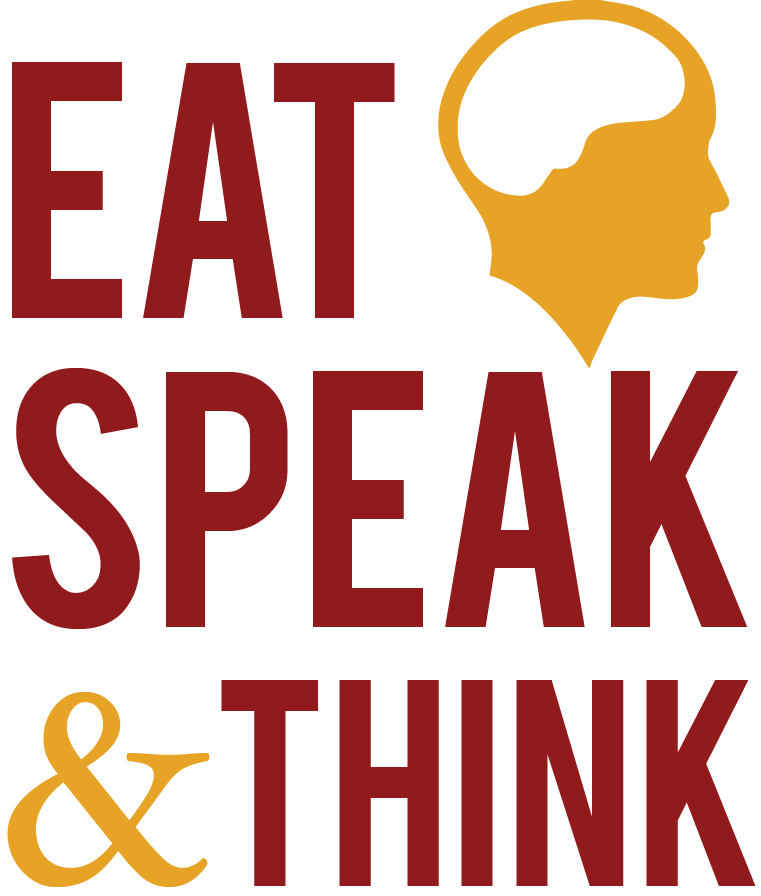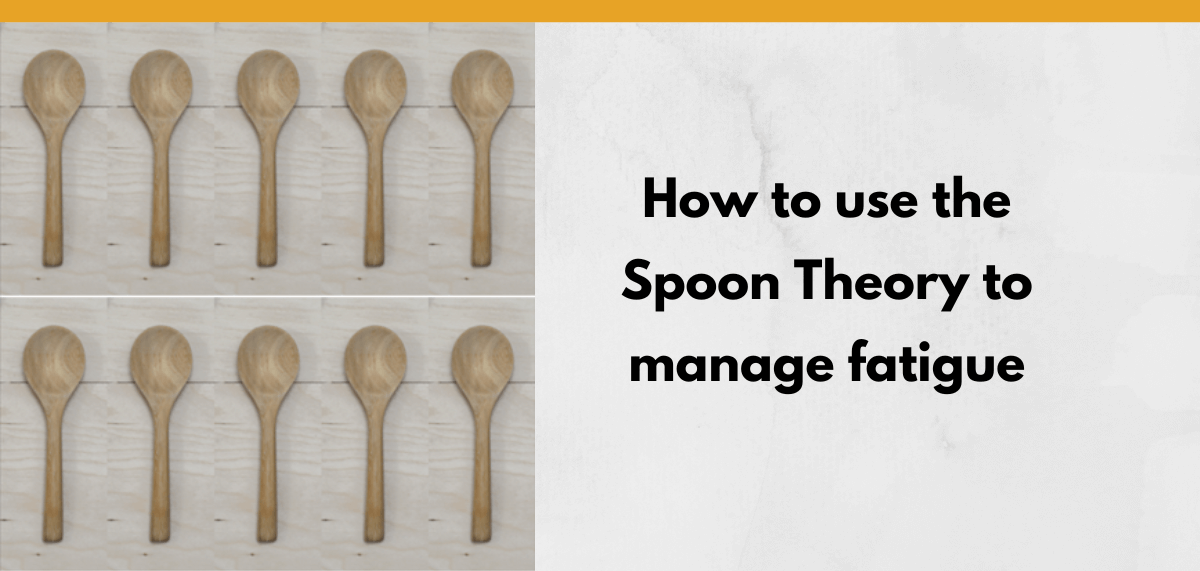Chronic fatigue is a condition that can occur with a number of medical conditions, such as multiple sclerosis (MS), chronic obstructive pulmonary disease (COPD), and long COVID. Learn how the Spoon Theory can help you manage fatigue and take the Leftover Spoons Challenge. The free download includes an energy log, two “Plan Your Day” charts, and instructions.
Free DIRECT download: Using the Spoon Theory for fatigue (patient handout). (Email subscribers get free access to all the resources in the Free Subscription Library.)
Outline:
- What is chronic fatigue?
- What is the Spoon Theory?
- How can I use the Spoon Theory to manage fatigue?
- What if I don’t have enough spoons for the day?
- Leftover Spoons Challenge.
- Related Eat, Speak, & Think posts.
- References.
What is chronic fatigue?
Chronic fatigue is persistent tiredness that interferes with daily activities and is not alleviated by rest or sleep. Fatigue can be mental (brain fog) or physical. The level of tiredness may fluctuate from day-to-day. Engaging in routine activities can result in worsening of symptoms.
Fatigue is a common complaint in many conditions. Click on each link for more information.
- Chronic Fatigue Syndrome.
- Fibromyalgia.
- Multiple Sclerosis.
- Lyme Disease.
- Depression.
- Sleep apnea.
- Hypothyroidism.
- Chronic Obstructive Pulmonary Disease (COPD).
- Long COVID.
What is the Spoon Theory?
Christine Miserandino wrote “The Spoon Theory” about her attempt to explain to a friend what it was like to live with chronic fatigue. Christine recounts her conversation with her friend at a restaurant, using a handful of spoons to demonstrate how she lives day-to-day with a limited amount of energy.
Here are the basic ideas:
- Healthy people have a seemingly unlimited number of spoonfuls of energy to get through their day.
- People who are fatigued have limited energy.
- They have to learn to budget their energy, or they risk “crashing”.
How can I use the Spoon Theory to manage fatigue?
First, figure out how many spoons you need for your common tasks. For 1-2 weeks, note down how many spoons of energy you think you have to use for your common tasks.
The free download for this article includes a week-long chart with several common activities and room to write more.
Once you have an idea of how much energy it takes you to do common activities, now you’re ready to plan your day.
When you wake up, estimate how many spoonfuls of energy you think you woke up with. This gives you a concrete number to work with.
You can write this number down on one of the “Plan your day” charts in the free download.
Now write down or check off your planned activities. Subtract the spoons you’ll use from what you started with. Do you have enough?
What if I don’t have enough spoons for the day?
Don’t push yourself. People with chronic fatigue risk “crashing” if they push too hard, even if they feel alright at the time. You know your body, and hopefully the Spoon Theory will help you make good decisions. You can also use this tool to advocate for yourself, as healthy people find it hard to understand.
Here are some specific tips:
- Modify an activity so that it takes less energy. A physical therapist or occupational therapist can be very helpful in figuring this out.
- Postpone an activity to another day.
- Break an activity into pieces and only do the first part today.
- Delegate one or more activities to someone else (friend, family, delivery, or other paid help).
- Prioritize. Only try to do what is within your energy budget for the day. You may have to make some hard decisions or risk a possible “crash”.
Leftover Spoons Challenge
Julie, a “Spoonie” for over 20 years due to living with a mitochondrial disease, has created the Leftover Spoons Challenge. The Leftover Spoons Challenge helps people maximize and use their energy to live their best lives. She has also created a number of very useful worksheets to support people in managing their energy, which are freely available on her site.
Related Eat, Speak, & Think posts
- How to treat post-COVID cognitive dysfunction.
- 3 evidence-based ways to treat cognition in MS.
- Useful tools to help people with cognitive impairment.
References
- American Thyroid Association. (2021). Hypothyroidism (Underactive). Retrieved from https://www.thyroid.org/hypothyroidism/
- Centers for Disease Control and Prevention. (2021). Lyme Disease. Retrieved from https://www.cdc.gov/lyme/index.html
- Centers for Disease Control and Prevention. (2021). Myalgic Encephalomyelitis/Chronic Fatigue Syndrome (ME/CFS). Retrieved from https://www.cdc.gov/me-cfs/index.html
- Healthline. (2021). Fatigue and Depression: Are They Connected? Retrieved from https://www.healthline.com/health/depression/fatigue
- Miserandino, C. (2003). The Spoon Theory. But You Don’t Look Sick. Retrieved from https://butyoudontlooksick.com/articles/written-by-christine/the-spoon-theory/
- National Heart, Lung, and Blood Institute. (2021). What Is COPD? Retrieved from https://www.nhlbi.nih.gov/health-topics/copd
- National Multiple Sclerosis Society. (2021). What is MS? Retrieved from https://www.nationalmssociety.org/What-is-MS
- Mayo Clinic. (2021). COVID-19 (coronavirus): Long-term effects. Retrieved from https://www.mayoclinic.org/diseases-conditions/coronavirus/in-depth/coronavirus-long-term-effects/art-20490351
- Mayo Clinic. (2021). Fibromyalgia. Retrieved from https://www.mayoclinic.org/diseases-conditions/fibromyalgia/symptoms-causes/syc-20354780
- Mayo Clinic. (2021). Sleep apnea. Retrieved from https://www.mayoclinic.org/diseases-conditions/sleep-apnea/symptoms-causes/syc-20377631
Free DIRECT download: Using the Spoon Theory for fatigue (patient handout). (Email subscribers get free access to all the resources in the Free Subscription Library.)
Lisa earned her M.A. in Speech-Language Pathology from the University of Maryland, College Park and her M.A. in Linguistics from the University of California, San Diego.
She participated in research studies with the National Institute on Deafness and other Communication Disorders (NIDCD) and the University of Maryland in the areas of aphasia, Parkinson’s Disease, epilepsy, and fluency disorders.
Lisa has been working as a medical speech-language pathologist since 2008. She has a strong passion for evidence-based assessment and therapy, having earned five ASHA Awards for Professional Participation in Continuing Education.
She launched EatSpeakThink.com in June 2018 to help other clinicians be more successful working in home health, as well as to provide strategies and resources to people living with problems eating, speaking, or thinking.



Be First to Comment